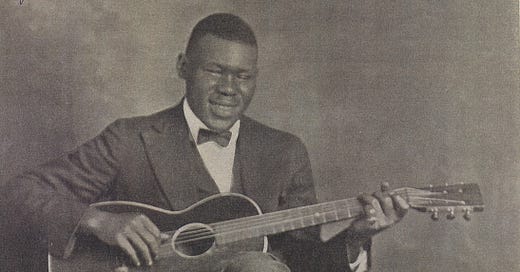Blind Blake’s Best Recording Session
The Master of Ragtime Blues in Richmond, Indiana, August 1929
In mid-August 1929, Blind Blake, guitar in hand, arrived in Richmond, Indiana, to record for the Paramount company. By then Paramount had already released dozens of stellar Blake records. His solo releases such as “Early Morning Blues,” “West Coast Blues,” and “Come On, Boys, Let’s Do That Messin’ Around” revealed him to be one the era’s most facile fingerpickers. As Big Bill Broonzy claimed in his autobiographical Big Bill Blues, “He made it sound like every instrument in the band. I have never seed [seen] then, and haven’t to this day yet, seed no one that could take his natural fingers and picks as much guitar as Blind Blake.”
Blake had also recorded adventurous sides featuring backup musicians on piano, clarinet, kazoo, slide whistle, xylophone, woodblocks, and bones. He’d worked as a studio guitarist for Gus Cannon, Bertha Henderson, Ma Rainey, Elzadie Robinson, and Leola B. Wilson. His singing and mastery of the popular hokum style was on a par with that of Tampa Red, Georgia Tom Dorsey, and Big Bill Broonzy. The public loved his records.
Soon after his arrival in Richmond, Blake would record some of his most influential and admired recordings. With a population of about 30,000 residents, many of them Quakers, Richmond had a longstanding reputation for being hospitable to people of color. It had been a major stop on the Underground Railroad, and Earlham College, a quick walk from the Gennett studio where Blake would record, was founded to “oppose war and all forms of oppressions.” For blues and jazz musicians, Richmond was a welcoming destination.
Nestled in a gorge just below where National Road crosses the Whitewater River on Richmond’s western edge, the Starr Piano Company had launched Gennett Records in 1923. To facilitate making recordings on-site, the company built a stand-alone one-story studio a few steps away from the water’s edge.
Keep reading with a 7-day free trial
Subscribe to Talking Guitar ★ Jas Obrecht's Music Magazine to keep reading this post and get 7 days of free access to the full post archives.



